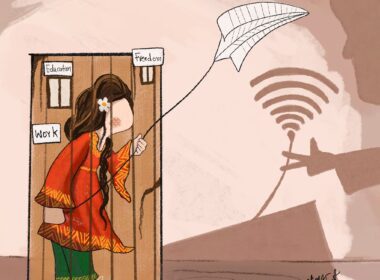In Conversation with Zala Ahmad
“We are in the business of distributing a life-changing and life-sustaining product: hope. This is a vital need for Afghan women today,” says Zala Ahmad, co-founder of SafePath Prosperity (SPP), a remarkable social enterprise dedicated to empowering women and girls in Afghanistan by providing access to sanitary products and menstrual health education.
A Fulbright Scholar and co-founder of the Humanitarian Organization for Local Development (HOLD), an Afghan-registered non-profit, Zala has over 15 years of experience in international development, with a focus on education, human rights, and economic development. Passionate about girls’ education and social justice, her work has led to transformative changes in some of Afghanistan’s most remote and dangerous rural areas.
SafePath Prosperity (SPP) creates over 200 jobs for impoverished Afghan women through its production centers in Afghanistan and employs many women who have experienced violence and abuse. Additionally, SPP trains and hires female youth advocates to educate Afghan women and girls about their reproductive and menstrual health rights. By tackling the stigma surrounding menstrual health and addressing a public health crisis that affects millions of girls and women in the country, SPP is contributing to the rebuilding of families and communities while uplifting the spirit of Afghan women.
I sat with Zala to learn more about her work.
Zala, I would love to start from the beginning. How did your childhood influence your career path and activism, especially your current work with SafePath and HOLD?
I was born in Farah province and grew up as a refugee in Pakistan, which shaped my understanding of displacement, resilience, and the importance of education. My father, who believed deeply in the power of education, made it possible for me to attend university. That opportunity changed my life, and I have carried with me a sense of duty to create similar pathways for Afghan women and girls.
In 2019, I co-founded SafePath Prosperity (SPP) as a personal investment of love and responsibility, launching it in a period of uncertainty and growing restrictions in Afghanistan. SPP runs production centers in Kabul and Kandahar, where we employ Afghan women to produce sustainable and reusable sanitary pads. Since we launched in 2020, we have employed 200 women and girls and distributed over 350,000 Safepad products. We offer women employment and livelihood opportunities, but also training, menstrual health and hygiene management awareness, psychosocial support, and access to health services. We also provide a safe space for women to gather, socialize, and support one another.
My early experiences instilled in me the conviction that economic empowerment and education are not luxuries, but rights. HOLD (Hope, Opportunity, Leadership, Dignity) is an extension of that vision—a commitment to ensure that no Afghan woman is left behind in a world that is rapidly moving forward.
What are some of the main challenges you face in running your centres under the current de facto government?
Operating under the Taliban regime has been an exercise in both perseverance and negotiation. We initially had to shut down in August 2021, uncertain if we could ever reopen. But the women we employed reached out to us directly—they were desperate for their jobs, their independence, and a space that gave them dignity.
Despite the risk, we reopened our production centers, navigating bureaucratic and cultural barriers with local community buy-in. Our work is one of the few remaining avenues where women can legally engage in economic activity under the health sector umbrella. But restrictions on women’s mobility, education, and work opportunities persist, making every day a challenge in logistics, safety, and morale.
How is the current political framework and the current ban on education for girls past grade six in Afghanistan affecting women’s access to health care, including menstrual care?
Restrictions on education have far-reaching effects on health and well-being, touching not only individual girls but Afghan society as a whole. A lack of education translates into a lack of health awareness, including issues related to menstrual hygiene, reproductive health, and emotional well-being. Without basic education, many girls grow into women unprepared to manage their health or advocate for their needs.
Banning girls’ education in Afghanistan severely hinders the country’s overall development by weakening its human capital, limiting economic growth, and perpetuating cycles of poverty and inequality. Educated girls grow into women who are more likely to contribute to the workforce, raise healthier families, and drive community progress—without their participation, the nation forfeits the potential of half its population, undermining social stability and long-term prosperity.
At SafePath, we see firsthand the consequences of this educational void. Many of the women who come to our centers have never received formal schooling in health. That’s why our programs are holistic—providing both employment and comprehensive health awareness through our Salamati Circles and Salamati app.
How does SafePath address the cultural stigma and taboo surrounding menstruation within Afghan families, where men are often the primary decision-makers? Can you share any stories about families impacted by Safe Path?
Menstrual stigma is deeply rooted in cultural norms. Many girls missed school during their periods, leading to a cycle of missed opportunities. Additionally, there was a prevailing mindset in some communities that girls were ready for marriage once they reached a certain age. In highly conservative societies, we also see that when resources are scarce, products for women are often not prioritized or are sacrificed. We aimed to shift this perspective.
At SafePath, we address this through trust-building and education. Our Awareness Program doesn’t just serve women—it prepares them to go back to their families and communities as educators and advocates. We frame menstrual health as a dignity issue, a family health issue—not just a “women’s issue.”
One story that always stays with me is of a woman who joined our center in Kandahar. She had six children and was on the verge of giving away her youngest because she couldn’t feed them. After joining SPP, she not only regained her financial stability but also began attending menstrual hygiene sessions. Eventually, she led peer workshops and helped her own family understand and support her work. These are the invisible transformations—changing how an entire household understands dignity and health.
In addition to providing sanitary aid, SafePath has an initiative called Salamati Circles and a Salamati App. Could you tell us more about what these entail?
The Salamati Circles are physical and virtual safe spaces where women can learn, heal, and grow. These circles are at the heart of our psychosocial and educational model. Women gather to discuss shared challenges—from menstrual health to entrepreneurship—and support one another through shared healing. It’s civic space in its truest form, especially in a country where such spaces are shrinking.
The Salamati App extends this circle into the digital realm. With over 80% of surveyed young women engaged in our awareness programs having internet access, we saw a powerful opportunity. The app features an information hub covering business, reproductive health, mental well-being, and leadership. The Salamati App serves as a digital safe space offering Afghan women and youth access to resources on health, entrepreneurship, and leadership, while fostering peer support, emotional resilience, and continued education for those whose schooling was interrupted. It aims to rebuild hope and connection through community-driven learning and psychosocial tools. It’s a supplemental tool that empowers tech-savvy female youth to continue learning and connecting, especially when physical gatherings are restricted.
What has been the most rewarding aspect of your work?
Without hesitation, it’s the transformation I see in the women we employ. From desperation to dignity, from isolation to empowerment. One young woman, once a fourth-year medical student who lost her dream of becoming a doctor, now serves as a Youth Advocacy Coordinator. She told me, “I don’t feel helpless anymore. My life has meaning again.” And the woman I mentioned, who nearly gave up her child in desperation, now earns a living and beams with pride at her ability to provide for her family.
Every time I see a woman walk through the doors of our centers with renewed hope in her eyes, I’m reminded why this work matters and that we need centers across the entire country.
How can the international community help tackle period poverty in Afghanistan or assist Afghan women and girls in gaining access to better healthcare and basic necessities?
First, listen to Afghan women. Let them guide the interventions. The donor community must shift from prescribing solutions to supporting locally informed, women-led initiatives.
Second, fund with vision. Large, flexible grants like the one we received from UN Women enabled us to expand to Kandahar. Too often, grants are too small, short-term, donor-driven, and restrictive to be transformative.
Third, procure from women-led businesses. If donor organizations and humanitarian actors prioritize buying from local women entrepreneurs, it can be a lifeline to sustainability.
Lastly, continue standing in solidarity with Afghan women. Period poverty is about more than just products—it’s about rights, dignity, and access. Every Safepad we produce is a symbol of hope and resilience. Help us scale that hope.
Zala Ahmad is the co-founder of Safe Path Prosperity, a women-led social enterprise that creates dignified employment opportunities for Afghanistan’s most vulnerable women and girls while promoting girls’ education, reproductive health, and youth leadership. A development practitioner and social entrepreneur with over 15 years of experience, Zala has led programs in education, peacebuilding, and women’s economic empowerment across some of Afghanistan’s most underserved regions.
She previously founded HOLD Afghanistan, a national NGO focused on girls’ education, peacebuilding, and women’s empowerment.
In recognition of her extraordinary efforts, Zala was honored by the U.S. Department of State in 2012 during the 10th anniversary of the U.S.-Afghan Women’s Council and received the Amel Zenoune-Zouani Rights & Leadership Award from iANGEL in 2023. Her life’s work continues to challenge norms, open doors, and transform possibilities for Afghan women and girls.
A Fulbright scholar, Zala holds an M.A. in International Economics and Finance from Brandeis University and has conducted research on gender and leadership at the University of Colorado Boulder.
Safe Path Prosperity
https://www.safepathprosperity.org/
Ways you can make an impact – https://www.safepathprosperity.org/waytogive















